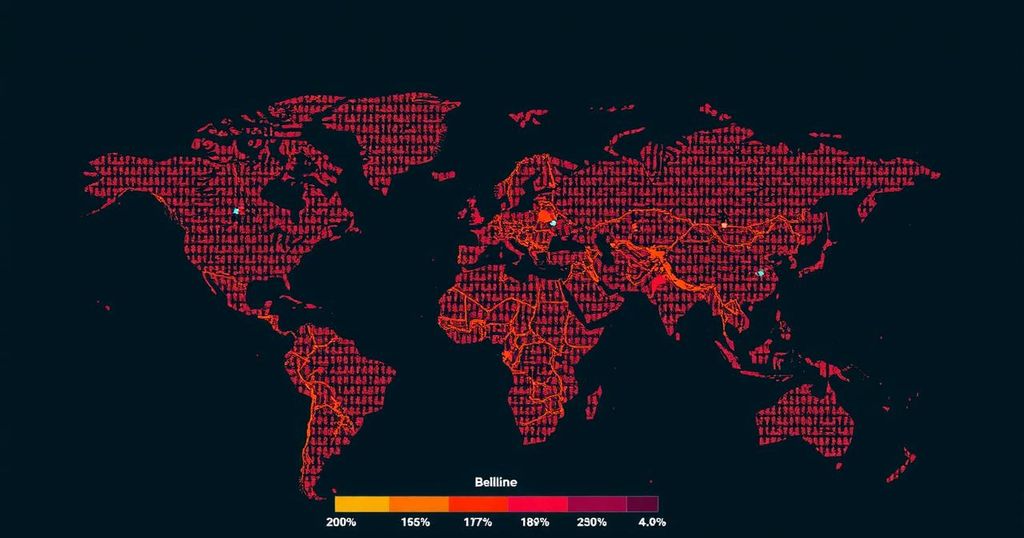In the DRC, with 6.5 million internally displaced persons, misinformation poses a significant threat to humanitarian operations. Wilfred Nkwambi from the World Food Programme outlines how disinformation undermines trust and safety in aid delivery, necessitating effective communication and community engagement to counter these challenges and build resilience.
The Democratic Republic of the Congo (DRC) faces a staggering internal displacement crisis, with approximately 6.5 million individuals displaced, primarily concentrated in four eastern provinces plagued by conflict and the prevalence of non-state armed groups. A significant yet often-overlooked challenge to humanitarian operations in this volatile environment is the spread of disinformation. Wilfred Nkwambi, the head of the World Food Programme’s (WFP) northeastern Goma office in North Kivu province, offered insights into how misinformation exacerbates humanitarian efforts in the region. Disinformation can severely disrupt humanitarian access and operations by distorting public perceptions of humanitarian organizations and their efforts. The WFP engages with numerous stakeholders, including local authorities and non-state armed groups, to navigate the complex landscape of security and access. However, the presence of false narratives and rumors propagated through social media can endanger the safety of WFP personnel and hinder crucial aid distribution. As Wilfred Nkwambi highlighted, “If we do not communicate effectively with local populations where we operate, our staff can be attacked or threatened, and our operations damaged.” Additionally, the role of social media has transformed the scrutiny placed upon humanitarian efforts. The WFP recognizes that stating a mission affiliation with the United Nations is no longer sufficient; stakeholders demand observable impacts of their work, which is often undermined by persistent disinformation. This affects not only aid delivery but also community relationships, increasing tensions within an already fragile environment. To counter these challenges, WFP emphasizes the importance of effective communication strategies. By actively engaging and educating communities about their operations, WFP seeks to dismantle misinformation and build trust. For instance, when adapting to local dietary preferences, the WFP held cooking demonstrations to familiarize displaced families with wheat, which is not a staple in their diets, thus fostering acceptance. Proactive measures are also taken to anticipate and address potential issues stemming from misinformation. Monitoring social media enables WFP to detect emerging rumors and misconceptions, allowing for timely interventions. Furthermore, partnerships with local media and community radio stations are pivotal in distributing accurate information to rural populations. Through sensitization campaigns targeting youth groups and local leaders, WFP successfully navigated recent security threats to ensure the safe transport of vital food supplies. Trust-building remains a core focus, achieved through training sessions designed for local communities, civil society activists, and media professionals. This educational approach ensures that stakeholders understand WFP operations and can communicate effectively. The organization also invests in internal training for field staff to enhance their awareness of protection and communication protocols. Overall, the intersection of disinformation and humanitarian aid in the DRC illustrates a complex challenge that requires diligent communication, community engagement, and innovative problem-solving to ensure that lifesaving support reaches those in need.
The Democratic Republic of the Congo is grappling with one of the most significant internal displacement crises globally, with 6.5 million people displaced due to ongoing conflict and instability. The eastern provinces, particularly North Kivu, are heavily impacted by the activities of non-state armed groups. Amid this crisis, humanitarian organizations such as the World Food Programme must navigate not only physical barriers to aid delivery but also the growing threat of disinformation. This misleading information, often propagated through social media, can have dire implications for the safety and efficacy of humanitarian operations, necessitating robust strategies for communication and community engagement.
In summary, disinformation represents a formidable challenge to humanitarian operations in the DRC, threatening safety and disrupting aid delivery. The World Food Programme’s proactive strategies, including community engagement, communication training, and partnerships with local media, aim to combat misinformation and build trust within affected populations. As the situation evolves, continued vigilance and adaptability will be essential for successfully mitigating the impacts of disinformation on humanitarian efforts.
Original Source: www.wfp.org






